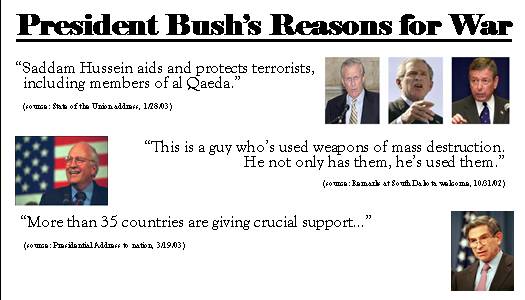|
It has been almost six years since the United States was attacked on its own soil by Islamic radicalists who were mad at us for a whole slew of reasons, ranging from the historic conflict between Christians and Muslims dating back to the Crusades to our high and mighty sense of being the world's keeper and need to meddle in everyone's business... never mind our invasion into Saudi Arabia, their holy land, during the first Persian Gulf War. Six years later, rather than living in a world that is more safe and united, the United States lost quite a few allies and Americans are feeling less safe traveling abroad. We are no closer to eliminating al Qaeda as a global threat and we have actually lost focus of what we set out to do. We got ourselves into a dead-end war in Iraq - a country that had NOTHING to do with 9/11 - and now we can't find a way to get ourselves out of it. Our involvement in Iraq now has outlasted the time American troops spent fighting in World War II. Rather than resembling the first Gulf War, it is more in line with what Vietnam looked like thirty years ago.
Although undenialy blame must be placed squarely on the shoulders of one President George W. Bush, since this is first and foremost his debacle, Congress - including the Democrats who took over power as a result of last November's election - is at fault as well. As a pillar of our federal government, it is the duty of Congress to act as the buffer against the monopolizing of power by the Executive branch. However, under Republican power, Congress acted as an appeaser instead. While the Democrats are certainly more vocal and combative against President Bush than the Republicans ever were, their inability to create a coherent and succinct voice has prohibited them from being productive in ending this senseless war (and certainly, not our war to fight) and bringing our troops home.
I think at this point most people can agree that war in Iraq was a mistake. Iraq is an artifical country created by the British and held together tentatively for decades by a brutal dictator. Without understanding that, we went in disillusioned and naive and disbanded a country filled with people who hated each other after CENTURIES of intolerance. And by doing so, not only did we unleashed them to go after one another, but we also created a fertile breeding ground for al Qaeda to come in and recruit more terroritsts. In President Bush's grand scheme of democratizing the Middle East, Iraq has made exisiting democracies in Jordan and Egypt less secure and a democratically-elected Hamas has surely made Gaza more safe for Palestinians, as recent developments showed. (*sarcasm here*)
So what have we learned the last six years? Hopefully, we learned that one, you can't bring democracy to people if they don't have the infrastructure or ability to sustain it themselves. Two, we fought the wrong war for the wrong reasons. Three, accountability needs to flow through every sector of the government. Four, we can't meddle in everyone else's conflicts and if we do, we need to at least meddle in that ones that we have real justifications for. I know it is very difficult for the United States to act after our past failures in Africa (i.e., Rwanda in 1994), but does that really justify us to pretty much just stand pat while massacres are happening in Darfur? And finally, we need to acknowledge that we are not superior to everyone else in the world just because we happen to have the biggest GDP, the largest nuclear arsenal, and the best universities on the planet.
May the over 3,000 men and women who died in this senseless war rest in peace...
=======
And here's something I made via MS Publisher for history class after the 2004 election:


|